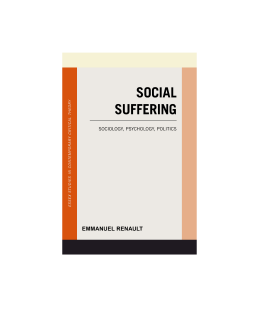
Additional Information
Book Details
Abstract
There are various forms of suffering that are best described as social suffering, such as stress, harassment, experience of poverty and domination. Such suffering is a matter of social concern, but it is rarely a matter of discussion in the social sciences, political theory or philosophy. This book aims to change this by making social suffering central to an interdisciplinary critical theory of society. The author advances the various contemporary debates about social suffering, connecting their epistemological and political stakes. He provides tools for recasting these debates, constructs a consistent conception of social suffering, and thereby equips us with a better understanding of our social world, and more accurate models of social critique.
The book contributes to contemporary debates about social suffering in sociology, social psychology, political theory and philosophy. Renault argues that social suffering should be taken seriously in social theory as well as in social critique and provides a systematic account of the ways in which social suffering could be conceptualised. He goes on to inquire into the political uses of references to social suffering, surveys contemporary controversies in the social sciences, and distinguishes between economical, socio-medical, sociological, and psychoanalytic approaches, before proposing an integrative model and discussing the implications for social critique. He claims that the notion of social suffering captures some of the most specific features of the contemporary social question and that the most appropriate approach to social suffering is that of an interdisciplinary critical theory of society.
Emmanuel Renault is Professor of Social and Political Philosophy at the University of Paris Nanterre. He is the author of several books on Marx, Hegel, social philosophy and contemporary critical theory. He is the former editor of the journal Actuel Marx and co-editor of Critical Horizons.
Translated by Maude Dews
Emmanuel Renault is the leading voice in the new wave of critical theory that has flourished in France in the last two decades. In Social Suffering, he demonstrates through staggeringly rich empirical detail and incisive conceptual analyses how individual experiences of social pathologies, the experiences of social suffering, can form the basis of a consistent critique of modern society. The book is a tour de force of contemporary critical theory, combining in masterful ways sociological, psychological and political reflection.
Jean-Philippe Deranty, Associate Professor of Philosophy, Macquarie University
In an age where precarious work, social exclusion, disaffection, and extreme poverty shadow the rise of globalized neoliberalism, social suffering is both an ineliminable critical concept for social theory and a crucial field for political action. In an elegant critical integration of sociology, psychology, anthropology, social medicine, history and political philosophy, Renault develops a critical theory of social suffering deftly tailored to current social pathologies.
Christopher F. Zurn, Professor of Philosophy, University of Massachusetts
Table of Contents
| Section Title | Page | Action | Price |
|---|---|---|---|
| Contents | 7 | ||
| Introduction | 9 | ||
| 1 Obstacles and Problems | 15 | ||
| 2 A Political Vocabulary | 69 | ||
| 3 Outlines of a Conceptualization | 107 | ||
| 4 Social Suffering and Social Criticism | 181 | ||
| Index | 211 | ||
| About the Author | 215 |
